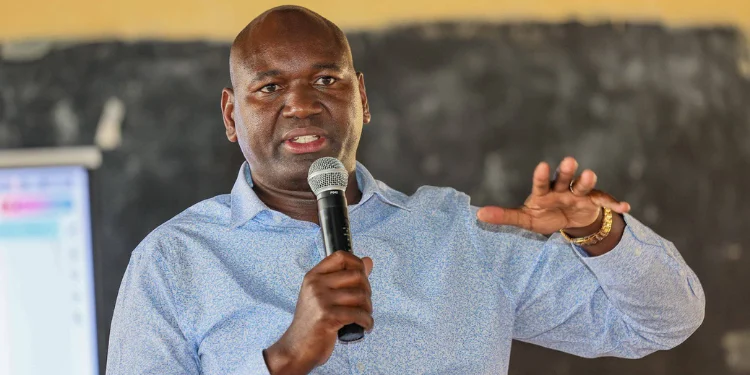By Victor Ochieng’
vochieng.90@gmail.com
This week, over 10,000 Principals of secondary schools converged in Mombasa for their annual national conference. The pow-wow was themed: Re-examining our future together; a new era in education. The school arrowheads met to discuss teacher-promotion, the competency-based curriculum, government readiness for junior secondary, teacher-preparedness and training. It is in the same convocation that the heads made a proposal for fees to be increased by Sh. 8,000, to cushion schools from acute cash crunch.
At the beginning, drug abuse among students took the centre stage. These men and women at the helm of decision-making in our schools cited drug abuse as one of the causes of spate of strikes and fires that rocked schools in the recent past. In their collective submission, the top guns called for Toxicological Tests (Drug Tests). They also advocated for the re-examination of the Children’s Act, which they believe favours students who display aberrant behaviour.
As someone who visits several schools to mentor students, I think the focus on drug test is a knee-jerk reaction to this wide-spread crisis. It is a total cock-up. It is general-permissiveness par excellence. We are telling teens that they can be high on narcotics, so long as they are not caught in the act. It is like Alcohol Breath Test (alcoblow). In case we don’t sensitise drivers on the dangers of driving while drunk, they will only remain sober so that they are not caught by men in blue. In case they find ways to use routes where the law can be breached, the drivers will always be tipsy while cruising cars.
Somehow, leaning on drug test as the smartest solution to yank students out of the horrible pit of drug abuse and addiction, is like slashing bushes instead of cutting the tree. It is akin to treating symptoms instead of tackling the root cause of the deadly disease. Let us steer clear here: How? Make our boys and girls know that abuse and misuse of drugs is utterly wrong. There is no debate about it. In the distant past, Saint Augustine of Hippo observed, “Wrong is wrong even if everyone is doing it, and right is right even if no one is doing it.” The narcotic drugs will pilfer their sanity, steal their sobriety, and rob from them the wealth of health.
Therefore, schools should come up with long-lasting solutions to this drug menace that make students to mutate to arsonists who fan ferocious flames of fire, and flagrantly raze down school property without a tad of mercy. Foremost, it is high time; all schools examine whether they always teach students nuts and bolts of Life Skills. Just to be blunt about it. There are plenty of schools where students are taught subjects like Mathematics when the timetable is saying it is time for Life Skills. When schools wend that way, this is the message we send to students: Life Skills are not important per se. They are jetsam and flotsam. Students can survive and thrive without such competencies. No wonder, many students end up struggling with immoral and criminal behaviour. Why? Because lack of Life Skills leads to mal-adjustment. They help teens to cope with two developmental challenges attributed to Erick Erickson: Identity Crisis and Identity Moratorium.
To augment this argument, Life skills can be welded well into three categories: One, intra-personal or self-awareness skills, which are basically competencies of knowing and living with oneself. Two, inter-personal skills, which focuses on the essence of living with others in the society. Three, we have skills of effective decision-making. Intra-personal skills include self-awareness, self-esteem, self-motivation, self-discipline, time management, stress management and Emotional Intelligence. Intra-personal skills include: Empathy, assertiveness, negotiation, conflict resolution, friendship-formation and effective communication. Pertaining skills of effective decision making, we have decision-making itself, making choices, critical thinking, creative thinking and problem-solving.
Moreover, there is exigent need to strengthen the psycho-social and spiritual programmes in our schools. This calls for formation of formidable departments of Guidance and Counselling. Teacher-counsellors should be trained, and equipped with basic helping skills. It is shell-shocking that some schools have teachers in charge of Guidance and Counselling who are veritable green-horns in matters counselling. When allotting responsibilities in staff meetings, there are teachers mandated to spearhead this sensitive docket because they look polite and pious. Yet, this is a sphere that requires core-competencies beyond kens of gentility and piety. Teachers who have intense interest to be in charge of departments of Guidance and Counselling should have basic training, at least a diploma in Counselling Psychology, will be of great help to such preceptors.
Consequently, in counselling, there is the wide window of referrals. Schools in cordial collaboration with parents, should identify addiction counsellors who can help students stuck in the sticky mud of drugs and substance abuse.
Again, drug abuse is both a psychological and spiritual problem. Students who are laden with psychological and spiritual loads will succumb to slavery of narcotic drugs. This calls for the essence of chaplains in our schools to work well with Departments of Guidance and Counselling to address deep-seated spiritual and psychological problems. As someone who interacts with young people on a grand scale, I have come to ascertain that some of the challenges teens grapple with are either psychological or spiritual. Some challenges require psychological approach. Some require spiritual approach. While some require a multi-dimensional approach.
In addition, I have cited the essence of having teachers who have been trained on rudiments of Counselling and Psychology. The Introduction to Psychology and Education Psychology done as units in college are not enough. Teachers should heed to the stern warning of Alvin Toffler, “The illiterate of the 21st Century will not be those who cannot read and write, but those who cannot learn, unlearn and relearn.” Teachers in the department of Guidance and Counselling should not succumb to the ‘destination disease’ or accept to be ‘starving bakers’. They should be swift to attend regular seminars and enroll for in-servicing courses as wonderful ways of building capacity and keeping abreast with emerging issues in the field. Teachers should read personal development books, which are outside their spheres of specialisation.
It is right to write: Teachers who are intellectually omnivorous will wield ethical requirements in counselling. For as I pen this piece, there are boys and girls in our schools who struggle with drug abuse and addiction, but can hardly seek help from teachers due to abject lack of ethical values, like: Beneficence, competence, confidentiality, fairness and fidelity.
To add heft to this argument, schools with strong spiritual programmes like regular fellowships and weekend challenges, awaken the spiritual and moral conscience of students. Schools where the fear of God is regarded as a core-value raises boys and girls who shun drug abuse and misuse. People gain wisdom in three different ways. One, accumulation of common sense is wisdom. Two, right application of knowledge is wisdom. And three, the fear of God is wisdom. Reverence of God, comes with bountiful benefits. Children who fear God, will strive to give meaning to 1 Corinthians 6:18-19: “Do you not know that your bodies are temples of the Holy Spirit, who is in you, whom you have received from God? You are not your own; you were bought at a price. Therefore, honor God with your bodies.”
Lastly, it is important to involve external speakers to complement the home-grown efforts of schools. There are men and women who roll out talks and training programmes that can help students gyrate towards sanity and sobriety. Principals who value mentorship programmes can attest to it: What young people do not learn through mentorship, they learn through pesky exploration, and risky experimentation.
The writer rolls out talks and training services in secondary schools.






